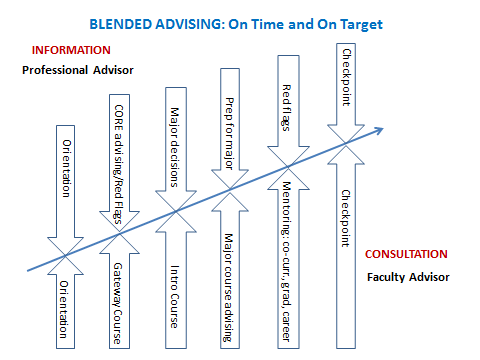Blended Advising Model
The Blended Advising model supports student progression through degree programs by offering access to both professional advisors and faculty mentors. Student advising needs evolve over the course of the college experience, and the blended model adjusts the advising and mentoring input to support students’ educational goals.
Students benefit from professional advisors who are specially trained to teach them about university policies, procedures, and program requirements, including developing short- and long-term educational plans.
Faculty advisors provide expertise related to majors and experiential opportunities that students can pursue to support educational goals. The blended advising approach seeks to keep students “On Time and On Target” to maximize the educational experience and enhance successful academic program completion.

The trend in academic advising is to build intentional, centralized advising services staffed with more than one type of academic advisor. The purpose of such advising systems is to improve the academic environment to enhance student success.
Academic advising is not a static process; the roles of advisors change as the student progresses through the academic program, so a single approach is hardly adequate in higher education generally or for a complex institution like UNG. Academic advising has the overarching goals of developing student self-efficacy and autonomous decision-making in reaching educational goals (Virginia N. Gordon, 2008; Gary L. Kramer, 2003).
UNG will utilize professional advisors trained in the institution’s academic disciplines as well as in the use of educational software and advising strategies that best support individual student needs on one side of a blended advising model. On the other side, faculty assumes the roles of mentors, building on the rapport with students established by professional advisors and supporting their engagement in educational opportunities.
Both types of advisors contribute to the personal development of the student by giving meaning and coherence to the educational experience by “building meaningful community out of mere connections” basic to the curriculum (Gary L. Kramer, 2003).